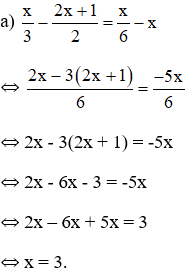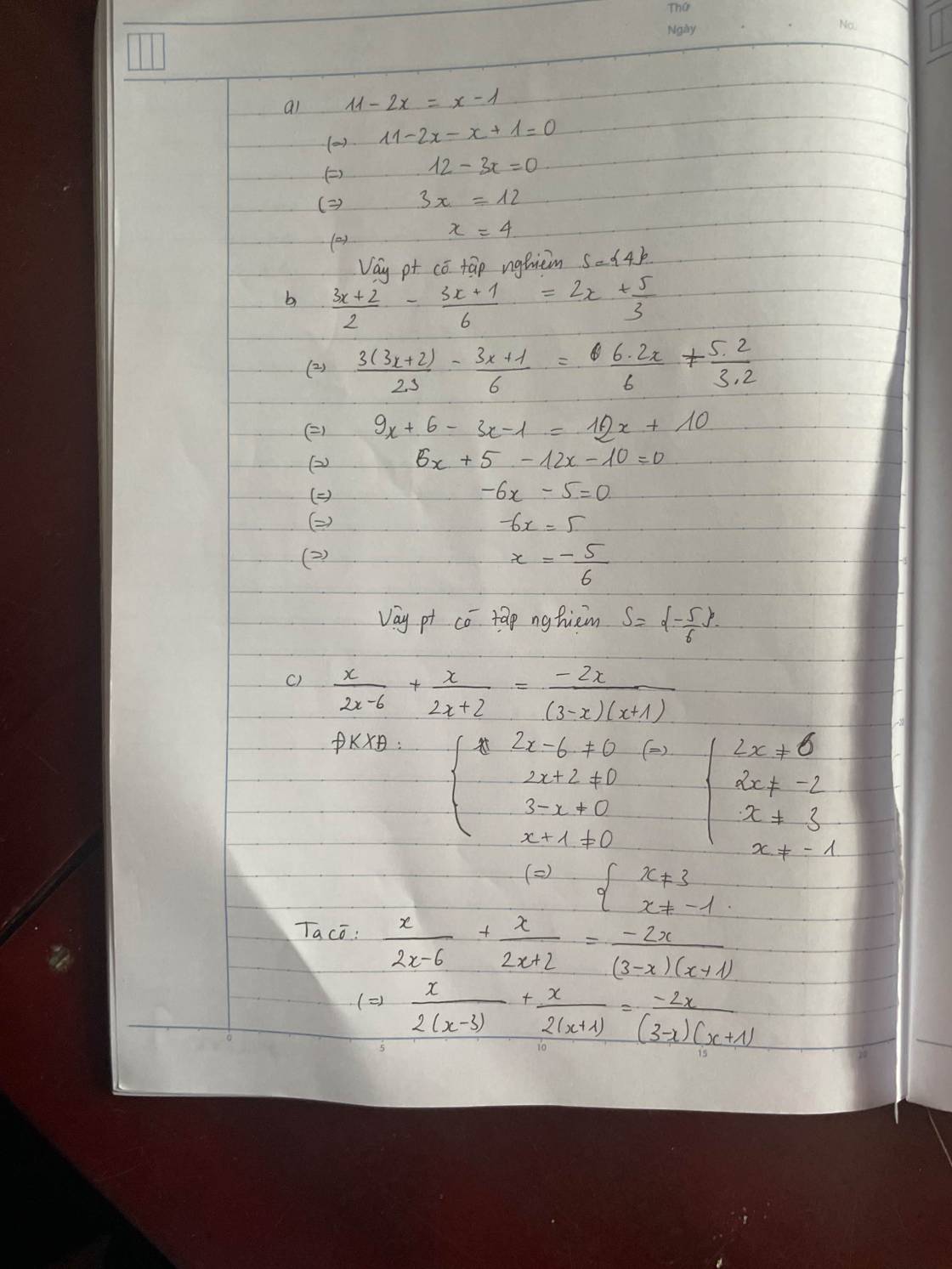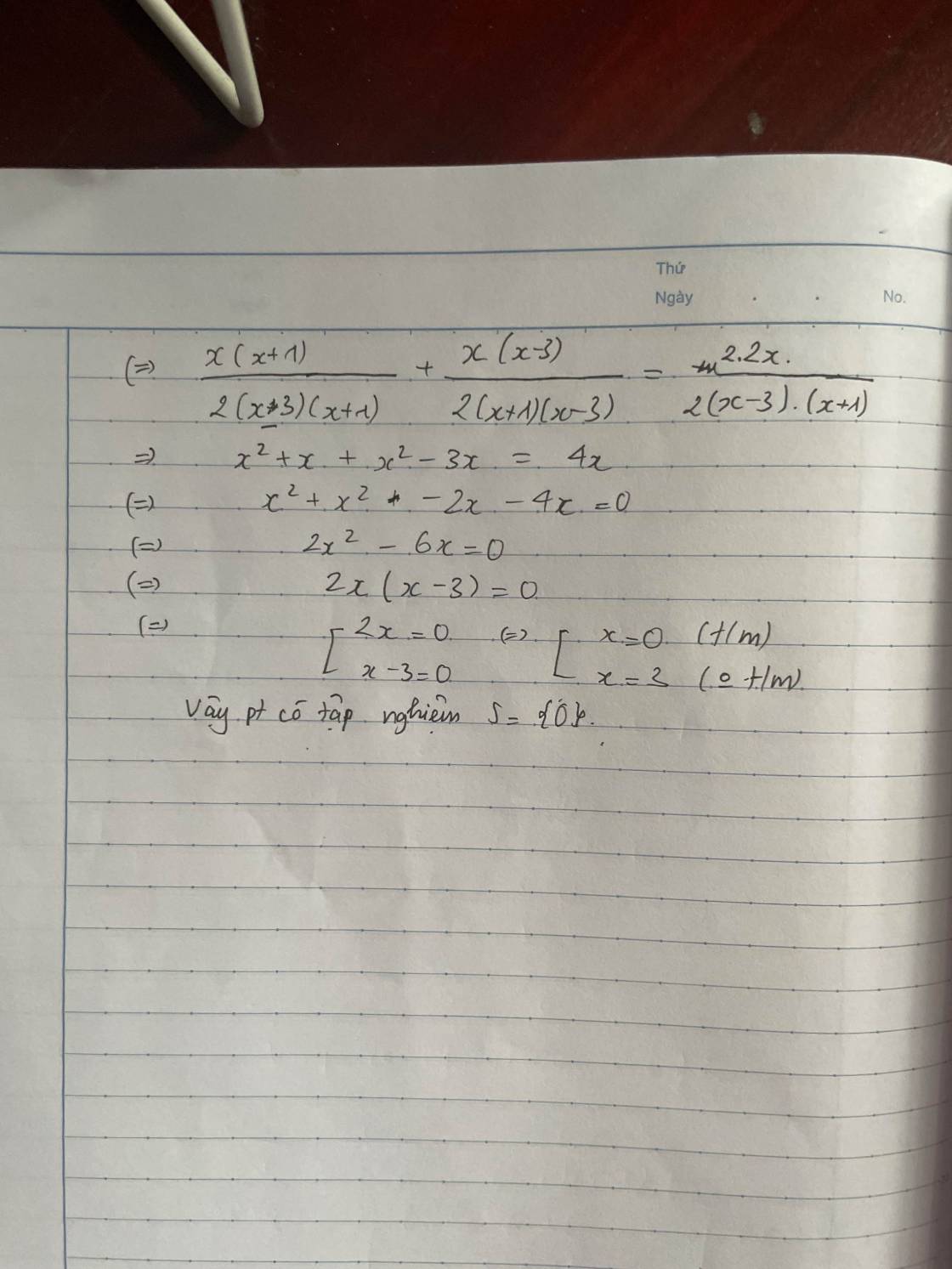
Hãy nhập câu hỏi của bạn vào đây, nếu là tài khoản VIP, bạn sẽ được ưu tiên trả lời.


k,\(\dfrac{x}{3}-\dfrac{2x+1}{2}=\dfrac{x}{6}-x\)
giúp mk câu k nhé đề bài như trên
b: \(\Leftrightarrow4x+8-9=4x-4\)
=>-1=-4(loại)
d: \(\Leftrightarrow3\left(x-2\right)+2\left(x+1\right)=8x\)
=>8x=3x-6+2x+2=5x-4
=>3x=-4
=>x=-4/3
f: \(\Leftrightarrow3\left(x+2\right)+4\left(2x-3\right)=2\left(x-12\right)\)
=>3x+6+8x-12=2x-24
=>11x-6=2x-24
=>9x=-18
=>x=-2

a: =>-3x=-12
=>x=4
b: =>3(3x+2)-3x-1=12x+10
=>9x+6-3x-1=12x+10
=>12x+10=6x+5
=>6x=-5
=>x=-5/6
c: =>x(x+1)+x(x-3)=4x
=>x^2+x+x^2-3x-4x=0
=>2x^2-6x=0
=>2x(x-3)=0
=>x=3(loại) hoặc x=0(nhận)

Mk giải giúp bạn phần a thôi nha! (Dài lắm, lười :v)
a, 1 + \(\dfrac{x}{3-x}\) = \(\dfrac{5x}{\left(x+2\right)\left(x+3\right)}+\dfrac{2}{x+2}\) (x \(\ne\) -2; x \(\ne\) \(\pm\) 3)
\(\Leftrightarrow\) \(\dfrac{3}{3-x}=\dfrac{5x+2\left(x+3\right)}{\left(x+2\right)\left(x+3\right)}\)
\(\Leftrightarrow\) \(\dfrac{3}{3-x}=\dfrac{5x+2x+6}{\left(x+2\right)\left(x+3\right)}\)
\(\Leftrightarrow\) \(\dfrac{3}{3-x}=\dfrac{7x+6}{x^2+5x+6}\)
Vì 3 - x \(\ne\) 0; x2 + 5x + 6 \(\ne\) 0
\(\Rightarrow\) 3(x2 + 5x + 6) = (7x + 6)(3 - x)
\(\Leftrightarrow\) 3x2 + 15x + 18 = 21x - 7x2 + 18 - 6x
\(\Leftrightarrow\) 10x2 = 0
\(\Leftrightarrow\) x = 0 (TM)
Vậy S = {0}
Chúc bn học tốt! (Nếu bạn cần phần nào khác mk có thể giúp bn chứ đừng có đăng hết lên, ít người làm lắm :v)
b)\(\dfrac{x+2}{x-2}-\dfrac{2}{x^2-2x}=\dfrac{1}{x}\\ \Leftrightarrow\dfrac{x\left(x+2\right)}{x\left(x-2\right)}-\dfrac{2}{x\left(x-2\right)}=\dfrac{x-2}{x\left(x-2\right)}\Leftrightarrow x^2+2x-2=x-2\\ \Leftrightarrow x^2+2x-2-x+2=0\Leftrightarrow x^2-x=0\\ \Leftrightarrow x\left(x-1\right)=0\\ \Leftrightarrow\left[{}\begin{matrix}x=0\\x-1=0\end{matrix}\right.\Leftrightarrow\left[{}\begin{matrix}x=0\\x=1\end{matrix}\right.\)
vậy..

ĐKXĐ: \(x\ne\pm1\)
\(\dfrac{\left(x+1\right)^2}{\left(x-1\right)\left(x+1\right)}-\dfrac{\left(x-1\right)^2}{\left(x+1\right)\left(x-1\right)}=\dfrac{x^3+3}{\left(x-1\right)\left(x+1\right)}\)
\(\Rightarrow\left(x+1\right)^2-\left(x-1\right)^2=x^3+3\)
\(\Leftrightarrow4x=x^3+3\)
\(\Leftrightarrow x^3-4x+3=0\)
\(\Leftrightarrow x^3-x^2+x^2-x-3x+3=0\)
\(\Leftrightarrow x^2\left(x-1\right)+x\left(x-1\right)-3\left(x-1\right)=0\)
\(\Leftrightarrow\left(x-1\right)\left(x^2+x-3\right)=0\)
\(\Leftrightarrow\left[{}\begin{matrix}x=1\left(loại\right)\\x^2+x-3=0\end{matrix}\right.\)
\(\Rightarrow x=\dfrac{-1\pm\sqrt{13}}{2}\)

`1/(3-x)-1/(x+1)=x/(x-3)-(x-1)^2/(x^2-2x-3)(x ne -1,3)`
`<=>(-x-1)/(x^2-2x-3)-(x-3)/(x^2-2x-3)=(x^2+x)/(x^2-2x-3)-(x-1)^2/(x^2-2x-3)`
`<=>-x-1-x+3=x^2+x-x^2+2x-1`
`<=>-2x+2=3x-1`
`<=>5x=3`
`<=>x=3/5`
Vậy `S={3/5}`
`1/(x-2)-6/(x+3)=6/(6-x^2-x)(x ne 2,-3)`
`<=>(x+3)/(x^2+x-6)-(6x-12)/(x^2+x-6)+6/(x^2+x-6)=0`
`<=>x+3-6x+12+6=0`
`<=>-5x+21=0`
`<=>x=21/5`
Vậy `S={21/5}`
a) ĐKXĐ: \(x\notin\left\{3;-1\right\}\)
Ta có: \(\dfrac{1}{3-x}-\dfrac{1}{x+1}=\dfrac{x}{x-3}-\dfrac{\left(x-1\right)^2}{x^2-2x-3}\)
\(\Leftrightarrow\dfrac{-1\left(x+1\right)}{\left(x-3\right)\left(x+1\right)}-\dfrac{x-3}{\left(x+1\right)\left(x-3\right)}=\dfrac{x\left(x+1\right)}{\left(x-3\right)\left(x+1\right)}-\dfrac{x^2-2x+1}{\left(x-3\right)\left(x+1\right)}\)
Suy ra: \(-x-1-x+3=x^2+x-x^2+2x-1\)
\(\Leftrightarrow3x-1=-2x+2\)
\(\Leftrightarrow3x+2x=2+1\)
\(\Leftrightarrow5x=3\)
hay \(x=\dfrac{3}{5}\)(nhận)
Vậy: \(S=\left\{\dfrac{3}{5}\right\}\)

Bài 1:
a.
$(4x^2+4x+1)-x^2=0$
$\Leftrightarrow (2x+1)^2-x^2=0$
$\Leftrightarrow (2x+1-x)(2x+1+x)=0$
$\Leftrightarrow (x+1)(3x+1)=0$
$\Rightarrow x+1=0$ hoặc $3x+1=0$
$\Rightarrow x=-1$ hoặc $x=-\frac{1}{3}$
b.
$x^2-2x+1=4$
$\Leftrightarrow (x-1)^2=2^2$
$\Leftrightarrow (x-1)^2-2^2=0$
$\Leftrightarrow (x-1-2)(x-1+2)=0$
$\Leftrightarrow (x-3)(x+1)=0$
$\Leftrightarrow x-3=0$ hoặc $x+1=0$
$\Leftrightarrow x=3$ hoặc $x=-1$
c.
$x^2-5x+6=0$
$\Leftrightarrow (x^2-2x)-(3x-6)=0$
$\Leftrightarrow x(x-2)-3(x-2)=0$
$\Leftrightarrow (x-2)(x-3)=0$
$\Leftrightarrow x-2=0$ hoặc $x-3=0$
$\Leftrightarrow x=2$ hoặc $x=3$
2c.
ĐKXĐ: $x\neq 0$
PT $\Leftrightarrow x-\frac{6}{x}=x+\frac{3}{2}$
$\Leftrightarrow -\frac{6}{x}=\frac{3}{2}$
$\Leftrightarrow x=-4$ (tm)
2d.
ĐKXĐ: $x\neq 2$
PT $\Leftrightarrow \frac{1+3(x-2)}{x-2}=\frac{3-x}{x-2}$
$\Leftrightarrow \frac{3x-5}{x-2}=\frac{3-x}{x-2}$
$\Rightarrow 3x-5=3-x$
$\Leftrightarrow 4x=8$
$\Leftrightarrow x=2$ (không tm)
Vậy pt vô nghiệm.

d: ĐKXĐ: \(x\notin\left\{2;-3\right\}\)
\(\dfrac{1}{x-2}-\dfrac{6}{x+3}=\dfrac{5}{6-x^2-x}\)
=>\(\dfrac{1}{x-2}-\dfrac{6}{x+3}=\dfrac{-5}{\left(x+3\right)\left(x-2\right)}\)
=>\(x+3-6\left(x-2\right)=-5\)
=>x+3-6x+12=-5
=>-5x+15=-5
=>-5x=-20
=>x=4(nhận)
e: ĐKXĐ: x<>-2
\(\dfrac{2}{x+2}-\dfrac{2x^2+16}{x^3+8}=\dfrac{5}{x^2-2x+4}\)
=>\(\dfrac{2}{x+2}-\dfrac{2x^2+16}{\left(x+2\right)\left(x^2-2x+4\right)}=\dfrac{5}{x^2-2x+4}\)
=>\(2\left(x^2-2x+4\right)-2x^2-16=5\left(x+2\right)\)
=>\(2x^2-4x+8-2x^2-16=5x+10\)
=>5x+10=-4x-8
=>9x=-18
=>x=-2(loại)
f: ĐKXĐ: \(x\in\left\{1;-1\right\}\)
\(\dfrac{x+1}{x^2+x+1}-\dfrac{x-1}{x^2-x+1}=\dfrac{2\left(x+2\right)^2}{x^6-1}\)
\(\Leftrightarrow\dfrac{x+1}{x^2+x+1}-\dfrac{x-1}{x^2-x+1}=\dfrac{2\left(x+2\right)^2}{\left(x-1\right)\left(x+1\right)\left(x^2+x+1\right)\left(x^2-x+1\right)}\)
=>\(\dfrac{\left(x+1\right)\left(x^2-x+1\right)\left(x^2-1\right)-\left(x-1\right)\left(x^2+x+1\right)\left(x^2-1\right)}{\left(x-1\right)\left(x+1\right)\left(x^2+x+1\right)\left(x^2-x+1\right)}=\dfrac{2\left(x+2\right)^2}{\left(x-1\right)\left(x+1\right)\left(x^2+x+1\right)\left(x^2-x+1\right)}\)
=>\(\left(x^3+1\right)\left(x^2-1\right)-\left(x^3-1\right)\left(x^2-1\right)=2\left(x^2+4x+4\right)\)
=>\(\left(x^2-1\right)\cdot\left(x^3+1-x^3+1\right)=2\left(x^2+4x+4\right)\)
=>\(2x^2+8x+8=\left(x^2-1\right)\cdot2=2x^2-2\)
=>8x=-10
=>x=-5/4(nhận)

a: Ta có: \(6-4x=5(x+3)+3\)
\(\Leftrightarrow6-4x-5x-12-3=0\)
\(\Leftrightarrow-9x=9\)
hay x=-1
b: Ta có: \(\dfrac{x+3}{2}-1=\dfrac{x-1}{3}+\dfrac{x+5}{6}\)
\(\Leftrightarrow15x+45-30=10x-30+5x+25\)
\(\Leftrightarrow15=-5\left(loại\right)\)
c: Ta có: \(\left(x-2\right)\left(2x+1\right)-3\left(x-2\right)=0\)
\(\Leftrightarrow2\left(x-2\right)\left(x-1\right)=0\)
\(\Leftrightarrow\left[{}\begin{matrix}x=2\\x=1\end{matrix}\right.\)
d: Ta có: \(\dfrac{2}{x^2-2x}+\dfrac{1}{x}=\dfrac{x+2}{x-2}\)
\(\Leftrightarrow2+x-2=x^2+2x\)
\(\Leftrightarrow x^2+x=0\)
\(\Leftrightarrow x\left(x+1\right)=0\)
\(\Leftrightarrow\left[{}\begin{matrix}x=0\left(loại\right)\\x=-1\left(nhận\right)\end{matrix}\right.\)




\(\dfrac{x}{3}-\dfrac{2x+1}{6}=\dfrac{x}{6}-x\)
\(\Leftrightarrow\dfrac{2x}{6}-\dfrac{2x+1}{6}=\dfrac{x}{6}-\dfrac{6x}{6}\)
\(\Leftrightarrow2x-2x+1=x-6x\)
\(\Leftrightarrow1=-5x\)
\(\Leftrightarrow x=\dfrac{-1}{5}\)